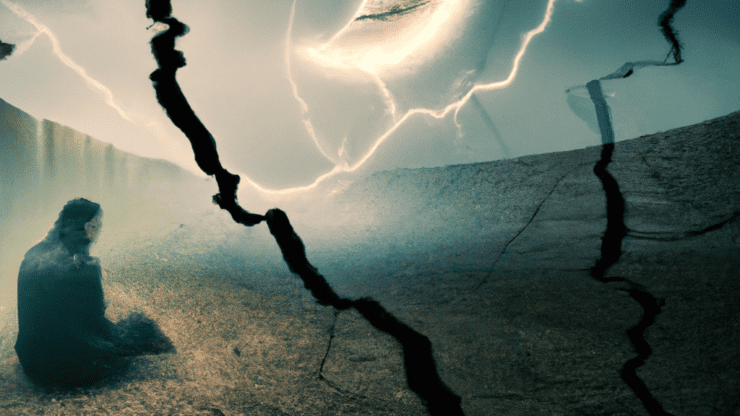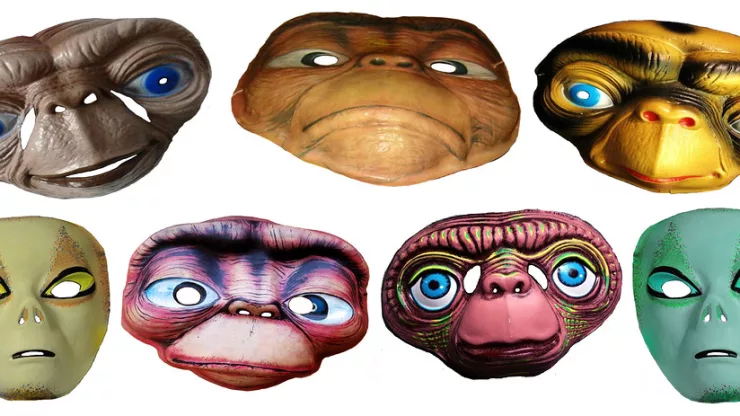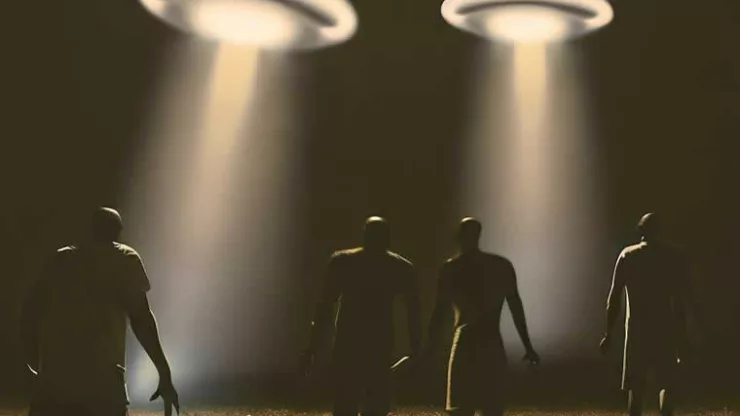In a vast universe filled with endless possibilities, the concept of encountering extraterrestrial beings has long been a source of fascination for humanity.
This fascination has not only found its way into popular culture and media but has also made a significant impact in the world of literature.
Alien encounters in literature have captured the imaginations of readers for centuries, offering a glimpse into the unknown and challenging our understanding of the universe.
In this article, we will delve into the various aspects of alien encounters in literature, exploring their history, common themes, societal impact, and their role in science fiction.
Jump to Section
Understanding the Phenomenon of Alien Encounters in Literature
History of Alien Encounters in Literature
- Ancient myths and legends: Even in the earliest forms of literature, such as ancient mythologies and folklore, tales of encounters with otherworldly beings can be found. These stories often served as a way to explain natural phenomena or explore the boundaries of human existence.
- Early science fiction: The emergence of science fiction as a genre in the 19th century opened up new possibilities for exploring alien encounters in literature. Writers like H.G. Wells with his iconic novel “The War of the Worlds” and Jules Verne with “From the Earth to the Moon” introduced readers to the idea of extraterrestrial life and the potential consequences of contact.
- Golden age of science fiction: The mid-20th century witnessed a surge in interest in science fiction, leading to an explosion of stories featuring alien encounters. Writers like Isaac Asimov, Arthur C. Clarke, and Ray Bradbury explored diverse themes and presented readers with imaginative and thought-provoking narratives.
Common Themes in Alien Encounters Literature
- The fear of the unknown: Alien encounters often evoke a sense of fear and uncertainty. The exploration of the unfamiliar and the potential threat posed by extraterrestrial beings creates tension and suspense in the narrative.
- Communication barriers: Language and cultural barriers between humans and aliens are a recurring theme in alien encounters literature. The struggle to understand one another and bridge the gap in communication adds depth to the story and highlights the challenges of interacting with beings from another world.
- Existential questions: Alien encounters in literature often raise profound existential questions about humanity’s place in the universe and the nature of our existence. These stories encourage readers to ponder the meaning of life, our place in the cosmos, and the possibility of other intelligent life forms.
Psychological and Societal Impact of Alien Encounters Literature
Alien encounters literature not only captivates readers but also has a profound impact on our psyche and society as a whole.
These stories tap into our innate curiosity about the unknown and challenge our preconceived notions of reality.
They spark our imagination, expand our horizons, and encourage us to think beyond the boundaries of our own world.
Additionally, alien encounters literature often serves as a reflection of the cultural, political, and social climate of the time, offering insights into the fears, hopes, and aspirations of society.
Notable Examples of Alien Encounters in Literature
| Title | Author | Year Published |
|---|---|---|
| “The War of the Worlds” | H.G. Wells | 1898 |
| “Childhood’s End” | Arthur C. Clarke | 1953 |
| “Ender’s Game” | Orson Scott Card | 1985 |
| “Contact” | Carl Sagan | 1985 |
| “The Left Hand of Darkness” | Ursula K. Le Guin | 1969 |
The Evolution of Alien Characters in Literature
Representations of Aliens in Early Literature
In early literature, aliens were often portrayed as grotesque, monstrous creatures with little resemblance to humans. They were the embodiment of the unknown and served as a way to evoke fear and awe in readers.
Examples of these early representations can be found in works such as Mary Shelley’s “Frankenstein” and H.P. Lovecraft’s “The Call of Cthulhu.”
Modern Portrayals of Aliens in Literature
In modern literature, the portrayal of aliens has evolved to reflect a more nuanced understanding of the possibilities of extraterrestrial life. Authors now often depict aliens as complex characters with their own motivations, emotions, and cultures.
They are no longer mere monsters, but beings with whom we can empathize and relate.
Examples of modern portrayals can be found in books like Octavia Butler’s “Lilith’s Brood” and Liu Cixin’s “The Three-Body Problem.”
The Role of Alien Encounters in Science Fiction
Influences of Alien Encounters Literature on Science Fiction Genre
Alien encounters literature has played a significant role in shaping the science fiction genre as we know it today.
The exploration of extraterrestrial life and the consequences of contact have become foundational themes in science fiction storytelling.
Writers like Isaac Asimov, Philip K. Dick, and Frank Herbert have expanded on the ideas presented in alien encounters literature, exploring the possibilities of advanced civilizations, interstellar travel, and the ethical implications of encountering alien species.
The Exploration of Technological Advancements in Alien Encounters Literature
Alien encounters literature often delves into the realm of technological advancements, presenting readers with imaginative depictions of futuristic technologies.
From advanced spaceships to mind-bending scientific concepts, these stories push the boundaries of what is possible and inspire readers to imagine a future where humanity has made incredible leaps in technological progress.
The Connection between Alien Encounters and the Search for Extraterrestrial Life
Alien encounters literature serves as a reflection of humanity’s ongoing fascination with the search for extraterrestrial life.
These stories not only entertain readers but also fuel our desire to uncover the truth about the existence of intelligent life beyond Earth.
The exploration of this theme encourages scientific inquiry and fuels the collective imagination, giving rise to real-world initiatives such as the Search for Extraterrestrial Intelligence (SETI).
Analyzing the Success of Alien Encounters Literature
Factors Contributing to the Popularity of Alien Encounters Themes
- Sense of wonder: Alien encounters literature taps into our innate curiosity and sense of wonder about the unknown. It allows us to explore new worlds, encounter strange and fascinating beings, and ponder the mysteries of the universe.
- Escapism: Reading about alien encounters offers a form of escapism from our everyday lives. It transports us to distant galaxies, immerses us in thrilling adventures, and allows us to experience the extraordinary.
- Reflection of society: Alien encounters literature often serves as a reflection of the hopes, fears, and aspirations of society. It offers a lens through which we can examine our own beliefs, values, and prejudices.
- Intellectual stimulation: These stories challenge our assumptions and encourage critical thinking. They present us with complex moral and philosophical dilemmas, forcing us to question our own place in the universe.
- Universal themes: Despite their extraterrestrial settings, alien encounters literature often explores universal themes such as love, identity, and the search for meaning. These themes resonate with readers on a deeply emotional level.
Criticisms and Controversies Surrounding Alien Encounters Literature
While alien encounters literature has garnered widespread popularity, it has also faced its fair share of criticisms and controversies. Some critics argue that these stories often rely on tired tropes and lack originality.
Others question the scientific plausibility of the depicted scenarios and the accuracy of the scientific concepts presented. Additionally, some argue that these narratives perpetuate harmful stereotypes and reinforce xenophobic attitudes towards the “other.”
Conclusion
In the vast realm of literature, alien encounters stand out as a captivating and enduring theme.
From ancient myths to modern science fiction, these stories have captivated readers with their exploration of the unknown, their profound philosophical inquiries, and their ability to transport us to worlds beyond our imagination.
Alien encounters literature not only entertains but also challenges our understanding of the universe and our place within it.
FAQ
Are all alien encounters stories set in outer space?
No, not all alien encounters stories are set in outer space. While many stories do take place in space or on other planets, some narratives explore encounters with extraterrestrial beings on Earth or in alternate dimensions.
Are there any real-life instances of alien encounters?
While there have been numerous claims of real-life alien encounters, no conclusive evidence has been found to prove the existence of extraterrestrial life.
These claims often fall under the umbrella of UFO sightings and conspiracy theories.
What makes alien encounters literature different from other genres?
Alien encounters literature stands out for its exploration of the unknown, its focus on extraterrestrial life, and its ability to challenge our understanding of the universe.
It combines elements of science fiction, fantasy, and speculative fiction to create narratives that expand our horizons and ignite our imagination.
Can alien encounters literature have an impact on scientific advancements?
Alien encounters literature can inspire scientific inquiry and fuel the imagination of scientists and researchers.
The exploration of futuristic technologies, interstellar travel, and the search for extraterrestrial life in these stories often serves as a catalyst for scientific advancements and the development of new ideas.
How has the portrayal of aliens in literature evolved over time?
The portrayal of aliens in literature has evolved from grotesque, monstrous creatures to more nuanced and complex beings.
In early literature, aliens were often depicted as otherworldly and terrifying, while modern portrayals present them as intelligent, emotional, and culturally diverse entities.
This evolution reflects our changing understanding of the possibilities of extraterrestrial life.
Do all alien encounters stories have a happy ending?
No, not all alien encounters stories have a happy ending. Some narratives explore the consequences and challenges of contact with extraterrestrial beings, presenting readers with thought-provoking and sometimes tragic scenarios.
The endings of these stories can vary greatly, ranging from hopeful to devastating.
Greetings fellow space travelers, I am Draco Blaze, creator of Alienated Media who is passionate about exploring the unknown and writing about my experiences with extraterrestrial life.
My focus is on alien encounters and creating thought-provoking sci-fi short stories that transport readers to new worlds and realities.
Feel free to contact me at [email protected].





